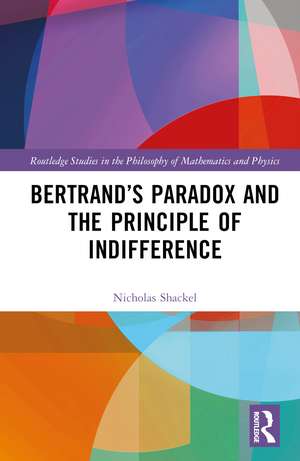Bertrand’s Paradox and the Principle of Indifference: Routledge Studies in the Philosophy of Mathematics and Physics
Autor Nicholas Shackelen Limba Engleză Hardback – 29 feb 2024
Bertrand's Paradox and the Principle of Indifference will appeal to scholars and advanced students working in the philosophy of mathematics, epistemology, philosophy of science, probability theory and mathematical physics.
Preț: 1015.10 lei
Preț vechi: 1237.92 lei
-18% Nou
Puncte Express: 1523
Preț estimativ în valută:
194.27€ • 202.07$ • 160.38£
194.27€ • 202.07$ • 160.38£
Carte tipărită la comandă
Livrare economică 15-29 aprilie
Preluare comenzi: 021 569.72.76
Specificații
ISBN-13: 9781032597935
ISBN-10: 1032597933
Pagini: 390
Ilustrații: 3 Tables, black and white; 27 Line drawings, black and white; 27 Illustrations, black and white
Dimensiuni: 152 x 229 x 22 mm
Greutate: 0.88 kg
Ediția:1
Editura: Taylor & Francis
Colecția Routledge
Seria Routledge Studies in the Philosophy of Mathematics and Physics
Locul publicării:Oxford, United Kingdom
ISBN-10: 1032597933
Pagini: 390
Ilustrații: 3 Tables, black and white; 27 Line drawings, black and white; 27 Illustrations, black and white
Dimensiuni: 152 x 229 x 22 mm
Greutate: 0.88 kg
Ediția:1
Editura: Taylor & Francis
Colecția Routledge
Seria Routledge Studies in the Philosophy of Mathematics and Physics
Locul publicării:Oxford, United Kingdom
Public țintă
Postgraduate and Undergraduate AdvancedRecenzii
“This is a very useful resource for graduate students and researchers interested in one of the most challenging puzzles in the theory of probability.”
Hykel Hosni, University of Milan, Italy
“This is essential reading for anyone seriously interested in Bertrand’s chord paradox or the broader epistemic issue of the status of the principle of indifference (and the maximum entropy principle.”
Darrell P. Rowbottom, Lingnan University, Hong Kong
Hykel Hosni, University of Milan, Italy
“This is essential reading for anyone seriously interested in Bertrand’s chord paradox or the broader epistemic issue of the status of the principle of indifference (and the maximum entropy principle.”
Darrell P. Rowbottom, Lingnan University, Hong Kong
Notă biografică
Nicholas Shackel is Professor of Philosophy, Cardiff University and Distinguished Research Fellow at the Oxford Uehiro Centre for Practical Ethics, Oxford University. His research is mainly on paradoxes and rationality. He has published numerous articles in books and leading journals including Journal of Philosophy, Mind, and Philosophy and Phenomenological Research.
Cuprins
1. The Principle of Indifference 2. The Principle of Indifference for Sets 3. Bertrand’s Paradoxes 4. The Threat to the Principle and Four Kinds of Solution 5. The Distinction Strategy 6. The Well‑posing Strategy 7. The Irrelevance Strategy 8. The Maximum Entropy Principle 9. The Universal Average 10. Meta‑indifference 11. Permissivism 12. Uniqueness a Criterion of Identity 13. Symmetry: the Forlorn Hope 14. Unearthing the Root 15. Bertrand’s Temptations 16. Rational Strength
Descriere
This book casts a new light on Bertrand’s Paradox, giving original analyses of the paradox, its possible solutions, the source of the paradox, the philosophical errors we make in attempting to solve it and what the paradox proves for the philosophy of probability.










